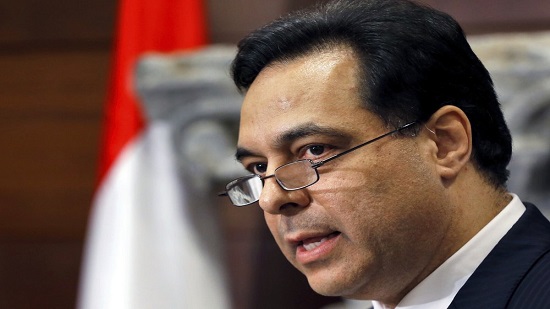BEIRUT (AP) — Lebanon s caretaker prime minister will not meet with the prosecutor investigating the Beirut port explosion as requested, persons familiar with the case said Monday, adding the premier has already given the prosecutor all the information he has.
Lebanon’s PM refuses further questioning over port blast
by Al Masry Al Youm
Copts and Poliltical Islam
00:12
Tuesday ,15 December 2020

Premier Hassan Diab and three former Cabinet ministers were charged last week by Judge Fadi Sawwan with negligence in the massive August 4 blast that killed over 200 people, injured thousands and caused widespread destruction in the capital.
The explosion was caused by the ignition of a large stockpile of explosive material that had been stored at the port for six years with the knowledge of top security officials and politicians who did nothing about it. The four are the most senior officials to be charged in the investigation and were set to be questioned as defendants this week by Sawwan, starting with Diab on Monday.
Diab, however, has rejected the charges as “politically targeting” the position of prime minister and accused Sawwan of violating the constitution and bypassing parliament. He has also received the support of the country s former prime ministers, Lebanon s top Sunni Muslim cleric and the militant Hezbollah group, a strong backer of Diab.
Lebanon s prime minister must be a Sunni Muslim, according to the country s sectarian-based power-sharing system.
A person familiar with the case said Diab would not meet with Sawwan. Another person referred inquiries about Diab s questioning to a statement issued by the prime minister s office last week. That statement said the premier informed Sawwan that “Diab has already provided all the information he had regarding this file, period.”
They spoke on condition of anonymity in line with regulations.
Diab had been questioned by Sawwan as a witness earlier but now he would face questions as a defendant.
The united front in support of Diab was seen by many as an attempt to block a precedent that might lead to accountability on a high level. A culture of impunity has prevailed in Lebanon for decades, including among the entrenched political elites. It has also fostered widespread corruption that has helped plunge Lebanon into the worst economic and financial crisis in its history.
Diab, a former university professor who has cast himself as a reformer among Lebanon s widely corrupt political class, was criticized by some activists for refusing to appear before Sawwan on Monday.
Rights lawyer Nizar Saghieh tweeted that Diab, like other politicians, is trying to “escape accountability by hiding behind his sect.”
Former finance minister Ali Hassan Khalil and former minister of public works Ghazi Zeiter told the daily Al-Akhbar that they also will not show up for questioning. Both are members of parliament and the legislature will have to remove their parliamentary immunity. It was not clear if former minister of public works Youssef Fenianos will show up at Sawwan s office.
In a stunning move, Judge Sawwan filed the charges against Diab and the three former ministers Thursday, accusing them of negligence that led to the death of hundreds of people.
Top security officials and politicians had known for years about the ammonium nitrate stored at a warehouse at the port and did nothing to remove or destroy it.
Diab, who is supported by Hezbollah and its political allies, resigned six days after the blast but remains in his post in a caretaker capacity, as Lebanese officials have failed to agree on a new Cabinet.
The move by Sawwan to exercise his discretion to accuse government officials came after he sent a letter and documents to parliament last month informing lawmakers of serious suspicions relating to government officials and asking them to investigate. The lawmakers responded by saying the material they received did not point to any professional wrongdoing.


